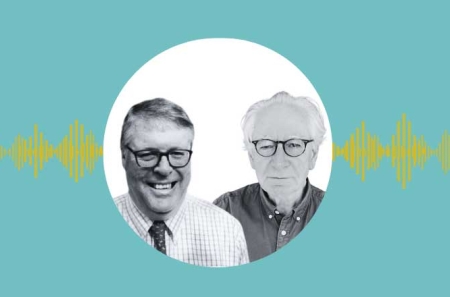
A tradition that ties us – Ben Lowry on unionism and journalism
01 May 2024My Identity conversation with Ben Lowry, by ARINS writers
Ben Lowry, Editor of the long-running Northern newspaper The News Letter, has always admired journalists who keep their political views to themselves. He might have remained such a journalist – ‘you know, when you don’t know what their thoughts are?’ But he made a ‘conscious decision’ after he became Deputy Editor in 2013 to reveal his politics in columns. The reason for this? ‘There is a lot of bias against unionism and I felt it needed help in defending its position,’ he explained in the RIA Dawson Street on Monday, 29 April at a public interview as part of the ARINS My Identity series.
Lowry was interviewed by Professor Colin Graham of Maynooth University in a room filled with political enthusiasts eager to hear his insights. (The interview ended with an audience Q&A and ARINS writers caught up with Lowry afterwards. These conversations form the basis of this article).

L-R: Professor Colin Graham and Ben Lowry
Lowry has worked for 17 years in The News Letter, the world’s oldest English language daily, founded in 1737. He joined as News Editor and became the paper’s Deputy Editor in 2013. Editor since 2021, with a close understanding of the paper’s readership, which on Saturdays is a print sale of approaching 20,000, we thought he was well placed to answer questions of identity expression and identity promotion that concern the ARINS project, and in the course of the afternoon he offered the audience an impassioned and sometimes trenchant sense of what it means to be unionist today.
As a history enthusiast, he takes a long view of politics in Northern Irish society. He said he is the only editor, perhaps in the world, to have run an On This Day 275 Years Ago and 280 Years Ago daily column because no other daily newspaper is old enough to have done so, except a German language paper. He did this using The News Letter's archives, which stretch back almost 300 years.
Among ‘random incredible stuff’, from early 1738 and 1739, reports on Jonathan Swift in Dublin, and what he believes would have been The News Letter's reports on Handel’s Messiah in 1742 (but papers from that year are lost), he pieced together for the RIA audience a picture of what seemed to be a basic Ulster society in the 1730s but by the 1780s had become a flourishing society, around the time of the revolutions in America and France and before the attempted Irish revolution of 1798. ‘You see the foundations of your society,' he said. Lowry also said that much later, in the early 1900s, ‘you could see the complacency of a privileged community that led to its near ruin.’
He was fortunate that his own upbringing was not one affected by sectarian violence, but he did have early memories of army checkpoints in the mid 1970s. Born in Portland, Maine, in 1971, his parents, both medics from Northern Ireland, returned to Belfast to raise their four children in 1974. This was just after the height of the Troubles. ‘But they thought it was solved, because of Sunningdale’, he said with a heavy dose of irony, referring to the attempt at power-sharing hashed out by the British and Irish governments in December 1973, an agreement which broke down in part due to unionist opposition.
British, Northern Irish, Protestant Irish, Scots Irish – these are some of the identities he felt aligned with growing up in Bangor in Co. Down, in a house along the coast where, on a clear day, you could see Scotland.
An avid follower of politics at Sullivan and then Campbell College in Belfast, he said that he later came to feel that even in those schools he had been taught what he described as an ‘anti-British’ history, when they used the Northern Ireland Board rather than the Oxford and Cambridge Board’s History syllabus. While at Campbell he cultivated the unusual habit of buying The Guardian and in his late teens espoused a left-wing nationalist ideology almost unheard of among his peers.
But his politics, and his understanding of faith, have shifted and evolved during a career that took him from qualifying as a Barrister at Law in London, to News International in London, working on The Sun and The Times, and later The Belfast Telegraph. He has come to appreciate the importance of Britain as a world power, and what he sees a its fiscal generosity and ‘gentleness’ towards terrorism in Northern Ireland. That he became more unionist than his parents was partly in response to what he described as ‘the scale of Irish nationalism and the feeble response of unionism. I developed not only a liking of it but a disliking of the maligning of it’.
‘There is a triumphant and aggressive nationalism on the island,’ he said. Appalled at the ‘bombing, murder and mayhem’ of the Troubles, he felt that unionism had suffered from this complacency and lack of leadership. A watershed moment for Lowry is the Anglo-Irish Agreement of 1985. He describes something of a ‘unionist nirvana’ before October 1985, the month before the British and Irish governments made a deal which, he said, was a ‘seminal disaster for unionists’, a form of ‘betrayal’ of unionism which has continued, in Lowry’s view, to the present day (he added that he is usually wary of using the word betrayal).
When asked about the nature of the state in Northern Ireland from partition to the beginning of the Troubles, Lowry recognised that there was some active sectarianism and discrimination but suggests that it has been grossly overplayed.

Ben Lowry
‘Complacency’ is term he often used about unionism in this period and later. So, for example, he thinks that unionism was complacent about the potential of the Independence referendum in Scotland in 2014. There was ‘no interest in it. We tried to generate interest in it in the paper.’ Similarly with the Brexit vote in 2016: ‘There was no real thinking about it, no thinking about the perils’. In August 2016, he published an editorial on Brexit with the headline ‘Despite what supporters of Brexit say, it might just blow the UK apart’. And while he predicted then that Brexit might ‘blow the UK to smithereens’ he is more optimistic today.
While suggesting that ‘Brexit could have led to much greater bitterness on both sides’ he argues that the fall-out of the Brexit vote, via the Protocol and the Windsor Framework, has done damage to Northern Ireland’s place in the Union. He added to this his view that 'the IRA through all its different tactics were unable to do what Brexit has done in disrupting internal UK trade’.
Does he have insights into what unionism might offer to a younger generation? ‘The maintenance of a connection to one of the wealthiest countries on earth. Unionism is a very important tradition on this island that should not be ignored.’ And looking into the future of unionist politics he agrees that the current situation is almost impossible to extrapolate into the future. Thinking about whether there might be a realignment in the unionist political parties, Lowry recalls an interview one of his fellow school pupils did with then UUP leader Jim Molyneaux, in which Molyneaux was asked whether unionism would be better served by one unified political party than the then two. Molyneaux suggested that if there was only one party then in fact there would be three unionist parties because the liberals and hardliners would both break away.
For Lowry there will always need to be two – one party which works pragmatically, one which is able to say no. He gave a sense of both why unionism sometimes fails to act pragmatically and why it needs to be able to say no.
Lowry is a newspaper man in a digital era with print readers of all newspapers dropping fast and digital not yet rising fast enough to counter that. His concerns were clear: ‘Newspapers are on life support.’
But it is not declining as badly as he feared. Ten years ago, he admitted, ‘I didn’t think I’d still be here. I was thinking of exit strategies.’ He added that the rate of decline has lessened and many people still value a printed newspaper.
One of the key challenges is getting younger readers to pay for quality journalism – which they will do, he said with confidence: ‘Because they will be old one day soon as well.’

L-R: Pauric Dempsey, Ben Lowry, Colin Graham



